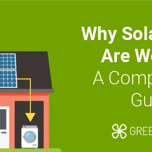Answer these simple questions and we will find you the BEST prices
Which type of solar quotes do you need?
It only takes 30 seconds
100% free with no obligation

Get up to 4 quotes by filling in only 1 quick form

Slash your energy bills by installing solar panels

For the average 2-3 bedroom house
- GreenMatch
- Solar Energy
- Solar Panels
- Solar Batteries
Solar Battery Storage in the UK: October 2025 Guide

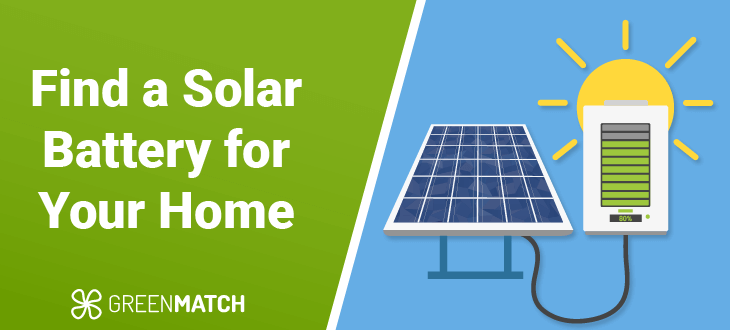
- Solar batteries ensure that you can store excess energy generated during peak sunlight hours for later use.
- Solar batteries reduce your reliance on the grid and provide a reliable backup in case of power shortages.
- The average cost of a solar battery system for a 3-bedroom house ranges from £8,000 - £9,500 and could potentially help you save around £1,518 annually on electricity bills.
Solar batteries are set to play a pivotal role in the green transition by effectively storing solar energy, enabling its use while your solar system isn't producing energy, like during the night or in darker periods, particularly in regions such as the UK.
In this article, we will provide a comprehensive guide to solar battery storage in the UK, covering what it is and how it works, solar battery prices, advantages and disadvantages, and the different grants for solar batteries available in the UK. Keep reading to find out more and gain the necessary insight before making a final decision.
Has this sparked your interest in batteries for solar panels? Researching and contacting reputable solar energy professionals one by one can take hours, if not days, of your precious time. To simplify this often time-consuming task, here at GreenMatch, we can connect you with up to four certified solar experts by simply completing our short 30-second online form.
This service not only saves time but also ensures access to expert advice and competitive pricing options without any obligation to commit. Get started by simply clicking the button below:
- Quotes from local engineers
- Payment by finance available
- Save up to £1,567 per year
It only takes 30 seconds



- What is a solar battery and how does it work?
- What types of solar batteries are there?
- What are the pros and cons of solar batteries?
- How much does solar battery storage cost?
- How to choose the best solar battery for your home
- Solar battery installation tips and practical information
- Is a solar battery storage system right for my home?
- FAQ
What is a solar battery and how does it work?
So, how exactly do solar batteries work? Solar battery storage systems are designed to store the excess energy generated by solar panels during peak periods of sunlight. They provide a steady supply of electricity during short and cloudy days, which are typical during winter in the UK.
Solar panels produce direct current (DC) electricity, which needs to be converted to alternating current (AC) electricity for any devices that plug into the wall of your home. Batteries store DC electricity so it is more efficient to have the solar panels feed them directly before converting the electricity to AC.
Consider a hybrid inverter as a versatile solution that can efficiently convert both DC and AC electricity, simplifying your home's energy infrastructure. When choosing between AC-coupled and DC-coupled battery storage systems, evaluating factors like efficiency and installation complexity is crucial.
However, it should be noted that homeowners do not usually need to make this decision themselves. Solar contractors will provide information about the best system for their needs free of charge.
Consult a reputable solar installer who can provide valuable insights and guidance to make an informed decision tailored to your specific needs and preferences. Instead of spending hours of your time looking for experts by yourself, simplify your solar journey by filling out our quick form to receive up to 4 free and non-binding quotes from local installers. This way, you can compare prices hassle-free and make a well-informed choice.
- Quotes from local engineers
- Payment by finance available
- Save up to £1,567 per year
It only takes 30 seconds



What types of solar batteries are there?
Solar batteries vary based on their chemistry which affects their efficiency, depth of discharge, and cost. Here are the main types available:
Lithium-Ion Solar Batteries
In general, lithium-ion batteries are better since they’re compact, lightweight, and long-lasting. They do, however, cost more than traditional batteries
Lithium ions move between the anode and cathode, releasing electrons and creating an electrical current.
- Efficiency: High energy conversion efficiency, often around 95%.
- Depth of Discharge: Typically 80% or more.
- Cost: £3,500 – £10,000+
- Efficiency: Lower than lithium-ion batteries, typical between 70-85%.
- Depth of Discharge: Around 50%, requires frequent checks.
- Cost: £2,500 – £9,500
- Types:
- Sealed: Maintenance-free but shorter lifespan.
- Flooded: Require distilled water top-ups but have a longer lifespan.
What are the pros and cons of solar batteries?
Solar batteries in the UK offer a host of advantages, such as partial or even full energy independence and a reduced carbon footprint. By allowing you to store surplus energy generated by your solar panels, solar batteries provide a reliable power source even when the sun takes a break or the utility power is cut because of technical faults.
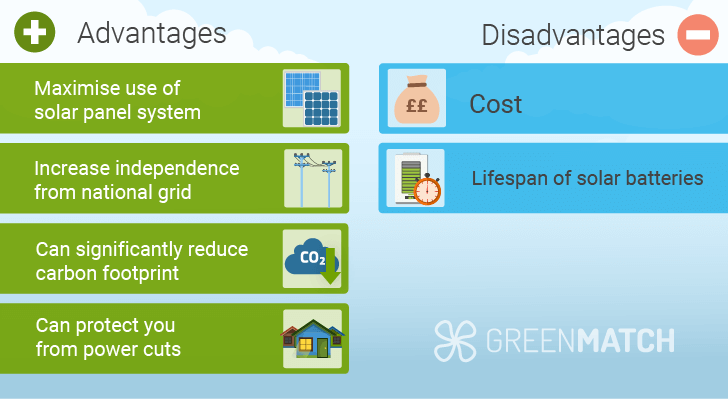
Here's a breakdown of the benefits that solar panel batteries bring to the table in the UK:
- Increased efficiency: Combining your solar panel system with a solar battery storage system enables you to optimise the solar energy generated by your panels by storing it for later use (such as when it’s dark out or on days when the sun isn't shining). In some utility districts this will enable you to capture more of the economic value of your solar electricity.
- Independence from the grid: Solar batteries can provide a valuable backup during power cuts and fluctuating energy prices by storing the excess energy produced by your solar panels.
- Eco-friendliness: By reducing your reliance on the national grid and storing electricity for later use, you can significantly decrease your dependence on polluting sources of energy like fossil fuel-generated electricity.
- Reduced energy bills: Batteries can cut your energy bill by up to 70% when paired with the most efficient solar panels in the UK, according to the Energy Savings Trust. While some reliance on traditional methods may be necessary based on your home and usage, you can still expect a notable decrease in energy expenses.
However, solar batteries also have their drawbacks, including:
- High upfront cost: In the UK, solar batteries can range from £2,500 - £10,000+ for a 6 - 14kW battery and about £8,000 - £9,500 for a 4kW battery for the average home. This makes them unaffordable for many homeowners with limited financial resources.
- Limited lifespan: Solar batteries tend to have a shorter lifespan compared to solar panels. You may need to invest in two solar batteries during the typical 25-year lifespan of solar panels.
If you've been wondering "Do solar panels increase home value?", the reduced energy bills, increased home value, and lower carbon emissions are significant benefits of solar batteries that are worth considering.
However, the initial cost can be significant, and storage capacity may not meet high energy demands.
Consulting with a solar professional is recommended to understand the benefits for your home. To easily compare solar panel quotes from local installers without the hassle of spending hours calling installers one by one yourself, simply fill out a quick form and receive up to 4 free quotes from trusted professionals in our network. Click below to get started with no obligation to accept any quotes.
- Quotes from local engineers
- Payment by finance available
- Save up to £1,567 per year
It only takes 30 seconds



How much does solar battery storage cost?
Currently, the most popular solar batteries cost between £2,500 and £10,000. These prices vary widely due to factors such as differences in capacity, battery type, and chemical composition. You can learn more about prices and the criteria from our picks for the best battery for solar panels.
Including the cost to install solar panels, you can expect the total supply and installation costs to come between £8,100 – £28,500 (6 - 14kW). It's recommended that you install a solar battery alongside a solar panel system to consolidate labour costs and save some money.
Below is a table of some of the most popular batteries available on the market with an estimation of what they cost in 2026:
| Solar batteries in the UK: Cost & savings | ||||
|---|---|---|---|---|
| Household size | Solar panel system | Solar battery size required | Average costs of solar battery system | Annual savings: solar panels + battery |
| Small; 1-2 bedrooms | 3kW | 6kWh - 7kWh | £5,000 - £8,000 | £887 |
| Medium; 2-3 bedrooms | 4kW | 9kWh - 10kWh | £8,000 - £9,500 | £1,141 |
| Medium; 2-3 bedrooms | 5kW | 11kWh - 12kWh | £9,000 – £10,000 | £1,518 |
| Large; 4-5 bedrooms | 6kW | 13kWh - 14kWh | £10,000+ | £1,705 |
Use GreenMatch's solar panel calculator to estimate potential costs and savings for your home.
The prices in the table above are simply an estimation and don’t take installation costs or potential solar inverter costs into account. Installation costs can vary depending on factors such as the size of your battery and whether it’s AC- or DC-coupled. It is worth noting that the savings figures shown above are based on solar panel savings on electricity bills and Smart Export Guarantee (SEG) income.
Generally speaking, getting a battery for your solar system will double the cost of your solar panel system. However, it is important to remember that you do not need a battery with a solar system. In fact, most solar owners do not have one. If you have solar and the grid goes down, even if it is sun, your solar will turn off, and you will have no power unless you have a battery system.

Joshua M. Pearce is the John M. Thompson Chair in Information Technology and Innovation. He holds appointments at Ivey Business School and the Department of Electrical & Computer Engineering at Western University. He runs the Free Appropriate Sustainability Technology research group.
Although there have been some fluctuations in cost, the overall trend of solar battery prices is decreasing. This is similar to the situation when photovoltaic systems were new. As technology improves and solar batteries increase in popularity, the costs will naturally decline. Therefore, these current prices are predicted to decrease further.
This is when a professional installer could weigh in. They can offer you up-to-date information regarding solar battery prices and the costs of their installation services. This way, you can rest assured that you are not overspending on your new solar battery storage system.
You can click the button below to compare quotes from up to 4 solar installers in your area. With our simple form, it only takes 30 seconds to request free, no-obligation quotes to find the best deal for your home.
- Quotes from local engineers
- Payment by finance available
- Save up to £1,567 per year
It only takes 30 seconds



Are there grants available for solar batteries?
There are some government grants and schemes that can help you cover the costs of a new solar panel system, including solar batteries, or that can help you earn money post installation.
Below we've provided an overview of some of the solar battery grants available in the UK today.
| Solar battery grants UK | |||
|---|---|---|---|
| UK solar grants | Run time | Potential savings | Eligibility |
| 0% VAT | April 1st 2022 – March 2027 | £2,850 (4kW solar panels + battery) | All UK buyers |
| Smart Export Guarantee (SEG) | January 1st 2020 – (indefinite) | Additional £45 to £80 (£440 to £660 total energy savings) | Any solar panel owner |
At GreenMatch, we have a large network of qualified solar panel installers across the UK. This means we can connect you with up to 4 professional installers in your area so that you can easily compare their prices and choose the best solar panels and batteries for your home.
If you want to avoid wasting hours of your time and money on overpriced installation companies, then fill in our 30-second form and receive up to 4 free quotes. Our service is completely free and non-binding, so what are you waiting for? Click the button below to find the best solar panels for your home.
- Quotes from local engineers
- Payment by finance available
- Save up to £1,567 per year
It only takes 30 seconds



How to choose the best solar battery for your home
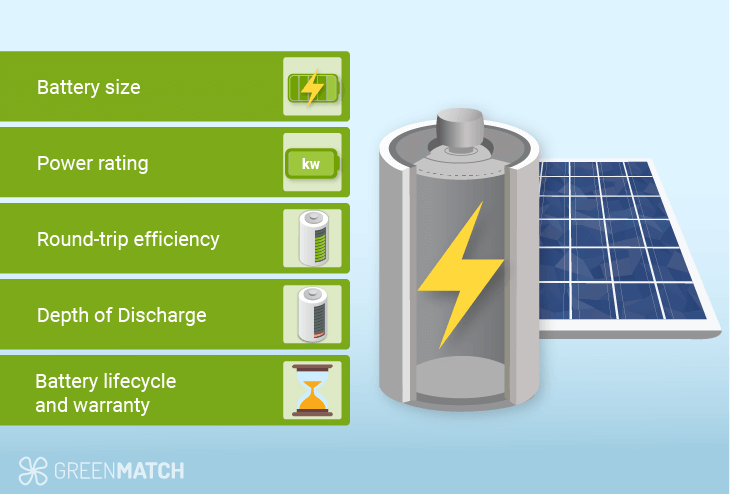
Before you compare the specs of various solar batteries, it’s important to understand which ones you should pay close attention to and what exactly they all mean.
Battery size. A battery’s capacity is the amount of electricity it can store. Battery size is measured in kilowatt-hours (kWh), which expresses how long a battery will be able to power your home for a given demand until the next full charge.
In particular, you should look for a battery’s “usable capacity,” which tells you how much of the stored electricity you can actually access.
Below is an overview of various solar panel systems and the corresponding solar battery size you need in the UK:
| Solar battery sizes | |
|---|---|
| Solar panel system | Required solar battery size* |
| 3kW | 6 - 7kWh |
| 4kW | 9 - 10kWh |
| 5kW | 11 - 12kWh |
| 6kW | 13 - 14kWh |
| 12kW | 27 - 28kWh |
Power rating. A battery’s power rating is expressed in kilowatts (kW) and tells you how many and what types of appliances you can power at once. The average sized home in the UK, with a 4kW solar panel system, will require a 9-10kW battery or smaller.
Round-trip efficiency. As mentioned earlier, you can lose energy by converting it from DC to AC electricity and back. Therefore, round-trip efficiency measures how well your battery and inverter convert and store electricity. It specifically tells you the percentage of energy put into the storage that can be retrieved again. A well-functioning battery can return 90% or higher for later use.
Depth of Discharge (DoD). Over time, batteries lose their ability to hold charge. DoD is a calculation of the remaining charge hold.
This means that the full energy storage capacity the battery has at purchase will deplete over years of use. Therefore, when buying a solar battery, it’s generally better to buy a battery with a higher DoD. New lithium-ion batteries will come with DoD with 80% or higher.
Battery life-cycle and warranty. A battery’s life-cycle measures the number of times you can charge and discharge a battery before it loses performance. In regards to the warranty, some solar manufacturers, like Tesla, provide an unlimited cycle guarantee, however, most give a figure which can range from 1,800 to 10,000 cycles.
Solar battery installation tips and practical information
There's a lot to consider before getting a solar battery and installing it. Below we've covered some additional questions that might arise during the process:
Can you add a solar battery to an existing solar PV setup?
Yes, it is almost always possible to retroactively install a solar battery as part of an existing solar panel system. This process will usually involve some modifications to the existing system and perhaps also require some new additional components, such as a charge controller.
How much space do you need for a solar battery?
Solar battery dimensions vary depending on the battery type and the manufacturer. Here are the typical dimensions you can expect with a 9-12kW battery:
- Height: 500mm - 1,700mm
- Width: 280mm - 790mm
- Depth: 150mm - 380mm
It's also worth noting that a powerful battery with a large storage capacity size doesn't mean that it will take up more space. Rather, it will depend on the energy density of the battery, which varies across different manufacturers.
Can solar batteries be kept outside?
Solar batteries should generally be stored indoors or in a garage. Some models are designed to be weatherproof and can therefore be stored outside.
How long does installation take?
A solar panel system installation, including a solar battery, typically requires 1-3 days, depending on the size of the system, the number of installers, and the overall complexity of the job.
Retrofitting a solar battery into an existing solar PV system will usually take around half a day to a full day's work.
Are solar batteries dangerous?
Solar batteries are designed to be very safe. If your solar battery were to overheat or combust, it would be of a very poor quality or defective.
Is a solar battery storage system right for my home?
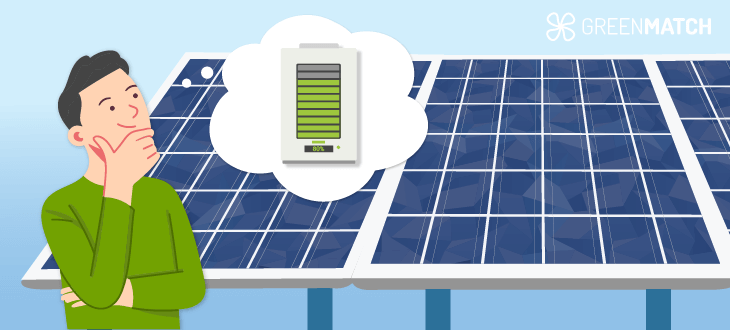
When deciding on the suitability of a solar battery for your home, it's crucial to ask yourself: "Are solar batteries worth it?" In the end, the choice to incorporate solar battery storage in the UK relies on your location and climate, individual energy requirements, financial constraints, and the space at your disposal. Even more so, it depends on the rate structure of your local utility and how much you prioritise reliable electricity.
For the average home, a 9-10kW solar battery is suitable if you wish to charge your battery up to its full capacity. This will cost between £8,000 - £9,500. By taking advantage of the Smart Export Guarantee, your annual savings could be brought up to £810, assuming an example tariff of 5.5p/kWh. You can learn more about the SEG at GOV.UK.
When deciding on a solar battery installation, key factors to consider include capacity (storage amount), efficiency (usable energy), depth of discharge (usable capacity), warranty, initial cost, maintenance, space requirements, location, battery lifespan, and energy needs. By keeping these factors in mind, you can find the best solar battery for your personal needs.
Seeking advice from a professional installer who can evaluate your circumstances and offer tailored guidance could prove advantageous.You could spend hours searching for installers and collecting the information by yourself, but how time-consuming and stressful would that be?
Thankfully, GreenMatch can do the legwork for you. All that’s left for you to do is fill out our 30-second form to obtain up to 4 quotes from our extensive network of vetted solar battery installers. No hidden fees or obligations to accept any offers. Simply click the button below to receive free quotes to compare.
- Quotes from local engineers
- Payment by finance available
- Save up to £1,567 per year
It only takes 30 seconds



FAQ
There are 5 solar battery types out there. However, lead-acid batteries and lead-ion batteries are the 2 most common types of solar batteries due to their cost-effectiveness and higher efficiency.
On average, a solar battery can power a house for 12-24 hours based on its capacity and the home’s energy consumption. For example, if your household consumes 30kWh per day, a 10 kWh battery can charge it for 8 hours.
Typically, 3-12kW solar batteries cost between £2,500 – £10,000. The average home will require a 9-10kW battery which costs £8,000 – £9,500.

Brontë is an experienced writer and editor for GreenMatch. Her passion for sustainability and renewable energy drives her to stay at the forefront of green-energy trends.


We strive to connect our customers with the right product and supplier. Would you like to be part of GreenMatch?

- Solar Battery in the UK | All Questions Answered (2026 Guide)
- What is a solar battery and how does it work?
- What types of solar batteries are there?
- What are the pros and cons of solar batteries?
- How much does solar battery storage cost?
- How to choose the best solar battery for your home
- Solar battery installation tips and practical information
- Is a solar battery storage system right for my home?
- FAQ
- Quotes from local engineers
- Payment by finance available
- Save up to £1,567 per year
It only takes 30 seconds




